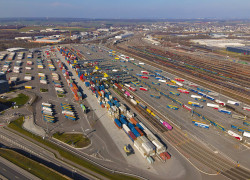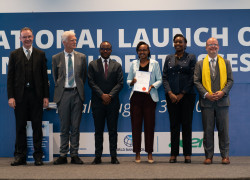The road to digitalisation: walking on sunshine or on burning coals?
Transformation is not an unknown concept for Luxembourg, a country that moved its economic orientation from blast furnaces to financial services. The government’s new aim to position the Grand Duchy as Europe’s next hub for technological innovation is about to become real. Big data, cloud computing, data analytics, mobile internet – new technologies already challenge business-as-usual.
But what will the future look like? “We don’t have a crystal ball for sure, but we can see trends that have been developing in the last few years, and build upon them to anticipate and get ready for changes”, said Gilles Vanderweyen, APSI Vice President and Partner at PwC Luxembourg, in the opening of a conference jointly organised by the American Chamber of Commerce in Luxembourg, the Association des Professionnels de la Société de l'Information (APSI) and PwC Luxembourg. The event gathered nearly 80 persons to discuss about the impact of new technologies on society and business.
Businesses should ride the new technologies’ wave
When it comes to innovation in technology business, “disruption” is the word on everyone’s lips. Its meaning is still not clear; some see it as a risk, others as an opportunity to be immediately seized.
“We all live in a logic of ‘Create Tomorrow Deliver Today’. We face an enormous growth of digital content that will disrupt traditional logistics and possibly lead to a complete new industry called Digital Logistics in the near future”, said Soltysiak Wojciech, Director for Technology Services at CHAMP Cargosystems. According to him, there are five main disruptive technologies to affect the logistic and cargo sector: Internet of Things, 3D printing, augmented reality, robotics and thinking machines/artificial intelligence. He believes that agility, consumerisation, social computing, cloud, mobility and predictive analytics have already changed the paradigm of Information Technology in enterprises.
Cyrille Foillard, Managing Director of PwC’s Accelerator, thinks the biggest source of disruption in the near future will continue to be mobile internet and cloud computing as they provide a low cost platform for innovative companies to reach billions of people and build massive user bases rapidly. In his opinion, “nobody is exempt from disruption. Even the current technology leaders, like Google, are at risk of being displaced. For example, the future of search and SEM may lie more in social media and in e-commerce websites. But more than disruptive technologies, we should talk about disruptive business models. Technologies are enablers that define the scope of the potential disruption, but they’re not always necessary; innovative business models are really what creates disruption because they make it very difficult for incumbents to respond to a new entrant in an economical way”.
Among the most disruptive business models today, he mentions the freemium model (promoted by LinkedIn), the free model (used by search engines) and, more importantly, the marketplace model (Alibaba and Amazon, but also the new companies of the so-called sharing economy, like Uber, Airbnb, Blablacar etc.). If “disruption” is the new black, how can start-up companies join the trend? “The answer is to look for under or over-served markets and bring your customers a cheaper, more convenient and or better solution when the ecosystem and customers behaviors are ready”.
To plug in or not to plug in? This is the question for society…
New technologies are game changers in business, but their influence goes deeper. They continuously shape and re-shape the future of politics, culture and civilisation. All the sensors and gadgets that monitor calories’ intake, heart rates, location and so on, will enable people to become panel statisticians who read and understand new data about themselves. “We’re producing more and more digital content in the sphere of minds, we’re plugged to everything and we feed our own data base. The next step will be the feedback – gadgets telling us that we need to eat less or to run more”, says Professor Louis Chauvel from the University of Luxembourg.
The increasing connectivity and data accumulation raise questions of security. In terms of privacy and control of the exchange of information, Luxembourg is among the safest countries in the world. However, the European Union loses ground in the globalisation game, with emerging countries offering more opportunities for open data. However, the problem is not the lack of regulation, but the lack of tools to implement them. “If you can’t audit the code behind an application, you can never know for sure how much information is actually stored or at risk. It’s not enough to educate and inform people of the different risks associated with the use of internet. As long as we can’t trust the code that runs our lives, we’ll have a problem that not even educated people will solve”, explains Sven Clement, partner at Clement & Weyer.
Society and business are at a turning point in history comparable with the industrial revolution two centuries ago - a time of great challenges and equally great opportunities. Paul Schonenberg, CEO of the AmCham Luxembourg, would rather keep an optimistic view on the future ahead. “Of course we must have a concerned look, but if you ask me, we should focus on the opportunities rather than on the risks”, he concluded.
Communiqués liés
RSA launches technology and management liability insurance s...
RSA Luxembourg, part of Intact Insurance Specialty Solutions, today announces th...
Lancement d'une nouvelle connexion intermodale entre Bettemb...
CFL multimodal a le plaisir d'annoncer le lancement de sa nouvelle connexion i...
Experts from LUNEX award first micro-credentials in Rwanda o...
The Rwanda Ministry of Education (MINEDUC) formally inaugurated Syllabi, a publi...
ERG Notes that ENRC Secures Landmark Victory as Court of App...
Eurasian Resources Group (ERG), a leading diversified natural resources group he...
LetzToken et La Vie est Belle annoncent leur partenariat ouv...
«?LetzToken?», plateforme de tokenisation pionnière basée à Luxembourg, et ...
ERG announces a Pre-Export Finance Facility Agreement based ...
Eurasian Resources Group (“ERG”, “The Group”), a leading diversified nat...
Il n'y a aucun résultat pour votre recherche







